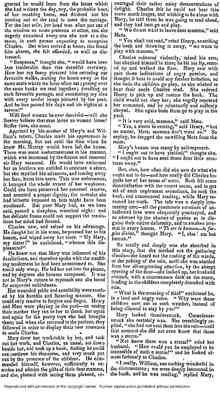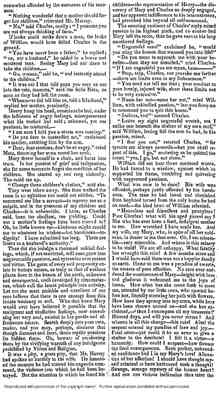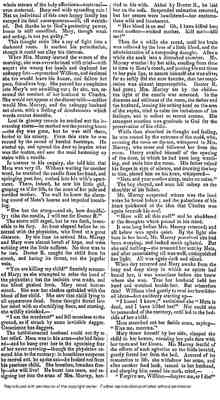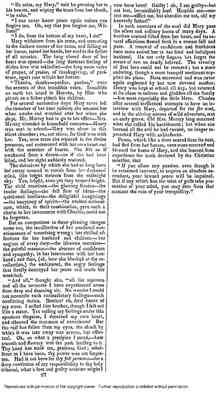Pages
11
granted he would learn from the letter which she had written the day, nay, the probable hour, of her reaching home, and doubted not his coming out on the road to meet the carriage. For the last mile, her head was often put out of the window on some pretence or other, and she eagerly examined every one she saw at a distance, in each person expecting to recognise Charles. But when arrived at home, she found him absent, she felt offended, as well as distressed. "Suspense," thought she, "would have been less intolerable than this dreadful certainty. How has my fancy pictured him retracing out favourite walks, musing the hours away on the same seats where we have often sat; poring over the same books we read together; dwelling on each favourite passage, and associating my idea with every tender image pictured by the poet. And he has passed his days and his nights at a tavern!" Will fond woman be ever deceived-will she forever believe that man loves as woman loves? Suffer then, she must. Apprized by his mother of Mary's and William's return, Charles made his appearance in the morning, but not until the time when he knew Mr. Murray would have left the house. There was some embarrassment in his manner, which was increased by the distant and reserved air Mary assumed. He would have embraced her as brothers are entitled to embrace a sister, but she repelled his advances, and turning away her face, burst into tears. This was unfortunate, it betrayed the whole extent of her weakness. Could she have preserved her assumed reserve, and asserted a proper dignity, the restraint she had hitherto imposed on him might have been continued. But poor Mary had, as we have said, passed a sleepless, wretched night: and her delicate frame could not support the resolutions her mind had formed. Charles saw, and seized on his advantage. He caught her in his arms, he pressed her to his bosom, and wiped away her tears. "My Mary, my sister!" he exclaimed, "whence this displeasure?" He knew not that Mary was informed of his derelictions, and therefore spoke with the confiding tenderness he had been accustomed to. She could only weep. He led her out into the piazza, and by degrees she became composed. It was not in Mary's nature to reproach one she loved for suspected unkindness. Her wounded pride and sensibility were soothed by his humble and flattering manner. She could only resolve to forgive and forget. Henry and Meta were playing in the yard-on seeing their mother they ran to her to thank her again and again for the pretty toys she had brought them; and when she returned to the parlour, they followed in order to display their new treasures to uncle Charles. Mary drew her work-table by her, and took out her work, and Charles, as usual, sat down beside her, and took up a book, finding he could not continue his discourse, and very much put out by the presence of the children. He commanded himself, however, sufficiently to examine and admire the gifts of their dear mamma, and she, pleased with seeing them pleased, encouraged their rather noisy demonstrations of delight. Charles felt he could not bear this scene much longer, and wishing to be alone with Mary, he told them he was going to read aloud, and they had best go and play. "We do not want to leave dear mamma," said Meta. "You shall not read," cried Henry, snatching the book and throwing it away, "we want to play with mamma." Charles coloured violently, raised his arm, but checked himself in time; he bit his lip, started up and wakled the floor. Mary saw with pain these indications of angry passion, and thought it best to avoid any further irritation, so she bade the children go play, as she wished to hear their uncle Charles read. She ordered Henry to pick up and restore the book. The child would not obey her; she angrily repeated her command, and he reluctantly and sullenly obeyed. She again bade them go to play in the yard. "It is very cold, mamma," said Meta. "Yes, a storm is coming," said Henry, "but no matter, Meta, mamma don't want us." So saying, he dragged the unwilling Meta from the room. Mary's bosom was stung by self-reproach. "I ought not to have yielded;" thought she. "I ought not to have sent those dear little creatures away." But, alas, how often did she now do what she ought not to do-and how easily did Charles beguile her of her sense of error. Both felt some dissatisfaction with the recent scene, and to get rid of such unpleasant sensations, he took the book, and commenced reading, while Mary resumed her work. The tale was a deeply interesting one;-all the passionate emotions of unhallowed love were eloquently pourtrayed, and so adorned by the charmes of genius as to disguise their native deformity, and to awaken interest in every bosom. "To err is human-to forgive divine," thought Mary. "I, alas! am but human." So totally and deeply was she absorbed in this story, that she marked not the gathering clouds-she heard not the rushing of the winds, or the pelting of the rain, until she was startled from her all-engrossing attention, by the abrupt opening of the door-she looked up, her husband entered, with a countenance dark as the storm, leading in the children completely drenched with rain. "What is the meaning of this?" exclaimed he, in a loud and angry voice. "Why were these children sent out in such weather, instead of being alowed to stay by you?" Mary looked thunderstruck. Conscience-struck she certainly was. She tremblingly replied, "she had not sent them into the rain-until that moment she did not even know that there was a storm." "Not know there was a storm?" cried her husband. "How could you be employed to be insensible of such a storm?" and he looked almost furiously at Charles. "I really, William, see nothing wonderful in the circumstance; we were deeply interested in the book, and he was reading," replied Mary,
12
somewhat offended by the sternness of his manners. "Nothing wonderful that a mother should forget her children," reiterated Mr. Murray. "No," said Charles, coolly; "I presume you are not always thinking of them." If looks could strike down a man, the looks of William would have felled Charles to the ground. "You have never been a father," he replied; "no, nor a husband," he added in a lower and muttered tone. Seeing Mary had not risen to take the children."Go, woman," said he, "and instantly attend to the children." "It was not I that told papa you sent us out into the rain, mamma," said the little Meta, as soon as they had left the room. "Whosoever did tell him so, told a falsehood," replied her mother, petulantly. Henry hung his head, conscious he had, under the influence of angry feelings, misrepresented what his mother had said; ashamed, yet not penitent, he muttered,"I am sure I told you a storm was coming." "Do not dare to contradict me," exclaimed his mother, catching him by the arm. "Dear, dear mamma, don't be so angry," cried Meta, throwing her arms round her neck. Mary threw herself in a chair, and burst into tears. In her passion of grief and indignation, she for some moments forgot the condition of her children. She started up and rang violently. The maid ran up. "Change these children's clothes," said she. They were taken away. She then walked the room in an agitation she could not subdue. "To command me like a servant-to reprove me as a culprit, and in the presence of my children and Charles-it is unbearable. I have, as Charles said, been too obedient, too yielding. Could not a mother's feelings have been trusted to? Oh, he little knows me-kindness might mould me to whatever he wishes-but harshness-indignity! I have submitted too long. There are limits to a husband's authority." Thus did she indulge a thousand unkind feelings, which, if not restricted, will soon grow into ungovernable passions, and tyrannize over reason and virtue. The germ of every evil propensity exists in human nature, as truly as that of noxious plants does in the bosom of the earth, unknown and unsuspected, until developed by circumstances, which call the latent principle into activity. Let not the most amiable and excellent of our race believe that there is one exempt from this innate tendency to evil. Who that knew Mary would ever have believed it possible that the malignant and vindictive feelings, now convulsing her very soul, existed in her gentle and affectionate nature. Search deeply into your own, reader, and you may, perhaps, discover that though dormant and inert, those reptile passions lie hidden there. Oh, beware of awakening them by the vivifying warmth of any indulgence prohibited by Virtue and Religion. It was a pity, a great pity, that Mr. Murray had spoken so harshly to his wife. He lamented the moment he had uttered his ungentle command, the violence into which he had been betrayed. But the situation in which he found his children-the representation of Henry-the discovery of Mary and Charles so deeply engaged, and he apparent indifference to his remostrance, had provoked him beyond all self-command. The sneering coolness of Charles' reply raised passion to its highest pitch, and no sooner had Mary left the room, that he gave vent to his long smothered feelings. "Ungrateful man!" exclaimed he, "would you sting the bosom that warmed you into life?" "Do you mean to reproach me with your benefits-then they are annulled," cried Charles. "If I am ungrateful you are mean, base--" "Stop, stop, Charles, nor provoke me farther-there are limits even to my forbearance." "You need not tell me that; your conduct to your lovely, injured wife, show these limits not to be very extensive." "Name her not-name her not," cried William, with rekindled passion, "lest you force me to command you to quite this house." "Jealous, too!" sneered Charles. "Leave my sight ungrateful wretch, ere I strike one beneath the shelter of my own roof," said William, letting fall the arm he had, in his passion, raised. "I fear you not," retorted Charles, "for tyrants are always cowards-but you shall repent of this. I go," muttering as he quitted the room; "yes, I go, but not alone." William did not hear these muttered words. He had turned to a window, against which he supported his frame, trembling and quivering with suppressed passions. What was now to be done? His wife was offended, perhaps justly offended by his harshness. The man he had loved and cherished from boyhood turned from the only home he had on earth-the kind heart of William relented. "Houseless and friendless and pennyless! Poor Charles! what will his aged parent say? She who has ever been a fond, indulgent mother to me. How wretched I have made her. And my wife, my Mary, who, in spite of all her coldness, is dearer to me that ever. Oh, I am miserable-very miserable. And where is this misery to be staid? We are all unhappy, What fatality has wrought this ruin? A few months sinse and I would have said there was not a happier family on earth. Home to me was a paradise of sweets, the sweets of pure affection. No care ever saddened the countenance of Mary-bright with love and gladness it welcomed me to the joys of home. How often has she come forth to meet me, attended by our little ones, who sported before her, literally strewing her path with flowers. How have they sprung into my arms, while hers have been thrown around us-and she has exclaimed,--'thus I encompass all my treasures!' Blessed days, and will you never return? And whence is all this change-this ruin? Alas! the serpent entered my paradise of love and joy.-Fatal error-yet could it be an error to give a shelter to a destitute? I felt it a virture-a humanity. How could I suspect-how foresee the fatal consequences. Such perfect, unbounded confidence had I in my Mary's love! Alienation of her affection! I should have thought myself criminal to have harboured such a thought! Strange, strange mystery of the human heart! And can one vicious inclination thus taint the
13
whole stream of the holy affections-maternal-even maternal. Deep and wide spreading ruin! Not an individual of this once happy family has escaped its fatal consequences-all, all wretched. But thanks be to God's protecting power, honor is still unsullied. Mary, though weak and erring, is not yet guilty." This thought stole like a ray of light into a darkened room. It soothed his perturbation, though it could not allay his distress. When Mrs. Murray learned the events of the morning, she was overwhelmed with grief-with anger; she wrung her hands and deplored her unhappy fate-reproached William, and declared she too would leave his house, and follow her poor, friendless boy. She poured her complaints into Mary's not unwilling ear; for she, too, resented the conduct of her husband to Charles. She would not appear at the dinner table-neither would Mrs. Murray, and the unhappy husband sat along, with a feeling of desolateness which words cannot describe. Lost in gloomy reverie he marked not the increasing storm-he marked not the passing hours-the day was gone, but he was still there, buried in his misery. Form this state he was roused by the sound of hurried footsteps. He started up, and opened the door to inquire what was the matter, and saw the maid hastening up stairs with a candle. In answer to his enquiry, she told him that Meta was very ill. Without waiting for another word, he snatched the candle from her hand, and springing past her, rushed into his wife's apartment. There, indeed, he saw his little girl, gasping as if for life, in the arms of her pale and terrified mother. Too well he knew the alarming sound of Meta's hoarse and impeded breathing. "She has the croup-and oh, how dreadfully; take the candle, I will run for Doctor R." The storm still raged, but he ran forth, insensible to its fury. An hour elapsed before he returned with the physician, who lived at a great distance. By the time he arrived Mrs. Murray and Mary were almost bereft of hope, and were sobbing over the little sufferer. No time was to be lost. Doctor R. caught the child from its couch, and baring its throat, cut the jugular vein. "You are killing my child!" franticly screamed Mary; as she attempted to seize the hand of the physician; but the incision was made, and the blood gushed forth. Mary stood horror-struck. She saw her clothes sprinkled with the blood of her child. She saw that child lying to all appearance dead. Some thought darted into her mind with an electrifying force, and starting, she wildly shrieked,-"I am the murderer!" and fell senseless to the ground, as if struck by some invisible dagger. Conscience has daggers. The half-distracted husband could not fly to her relief. Meta was in his arms-she had fainted-and he hung over her in the agonizing fear of her never reviving-though the physician assured him to the contrary: in breathless suspense he moved not, he spoke not-he looked not from his precious child. She breathes, breathes freely-she will live! He burst into tears, and resigning her into the arms of Mrs. Murray, hurried to his wife. Aided by Doctor R., he laid her on the sofa. Suspended animation returned, but her senses were bewildered-her exclamations wild and incoherent. "Her blood is on me! Oh, I have killed her; cruel mother-wicked mother. Kill me!-kill me!" Thus for a while she raved, until her brain was relieved by the loss of a little blood, and the administration of a composing draught. After a while she sunk into a disturbed slumber. Mr. Murray watched by her side, stealing from time to time to Meta's couch, and putting his ear close to her pale lips, to assure himself she was alive; for so softly did she now breathe, that her respiration was almost imperceptible. Doctor R. had gone; Mrs. Murray sat by the child-the light of the candle was screened. In the dimness and stillness of the room, the father and the husband, leaning his aching head on the arm of the sopha, tried to calm the turbulence of his feelings, and to reflect on recent scenes. His strongest emotion was gratitude to God for the preservation of his child. While thus absorbed in thought and feeling, he was roused by the entrance of the maid, who, crossing the room on tip-toe, whispered to Mrs. Murray, who arose and followed her from the room. Henry availed himself of the opening of the door, at which he had been long watching, and stole into the room. His father raised his finger in sign of silence, and drawing the boy to him, placed him on his knee, whispered-"Meta and your mother sleep, make no noise." The boy obeyed, and soon fell asleep on the shoulder of his father. Mr. Murray suspected whose was the loud noise he heard below; and the pulsations of his heart quickened at the idea that Charles was again beneath his roof. "How will all this end?" and he shuddered at the thoughts which passed in his mind. It was long before Mrs. Murray returned; and all below was again quiet. By the light she bore in her hand, Mr. Murray perceived she had been weeping, and looked much agitated. But she said nothing-she resumed her seat by Meta, and after ascertaining all was well, extinguished her light. All was again dark and silent. When day returned and Mary awoke from the long and deep sleep in which an opiate had bound her, it was sometime before she knew where she was. True her husband held her hand and watched beside her. But wherefore this? William tried gently to read her bewildered ideas-but suddenly starting up"I know! I know," exclaimed she "Meta is dead, and I have killed her!" Nor could she be persuaded of the contrary, until led to the bedside of her child. Meta stretched out her feeble arms, saying-"Kiss me, mamma." Mary threw herself by her side, clasped the child to her bosom, covering her pale face with her tears and her kisses. Mr. Murray fearful of the effects of such agitation on the little invalid, gently forced her from the bed. Assured of its restoration to life, she withdrew her arms, and after another fond look, turned to her husband, and clasping him round his neck, cried,"Forgive me, William-forgive me, or I die!"
14
"Be calm, my Mary," said he pressing her to his bosom, and wiping the tears from her cheek, "be calm." "I can never know peace again unless you forgive me. Oh, say that you forgive me, William!" "I do, from the bottom of my heart, I do!" Mary withdrew from his arms, and retreating to the darkest corner of the room, and falling on her knees, raised her hands, her soul to the father of all mercies. The long closed door of her heart was opened-the long dormant feeling of diving love was rekindled-the long mute voice of prayer, of praise, of thanksgiving, of penitence, again rose within her bosom. "Thanks, thanks-pardon, pardon," were the accents of that inaudible voice. Inaudible on earth but heard in Heaven, by Him who pitieth as a father pitieth his children. For several successive days Mary never left the chamber of her dear patient; she amused her when awake and watched over her when she slept. Mr. Murray had to go to his office-Mrs. Murray attended to household concerns-Henry was sent to school-Mary was alone in this silent chamber; no, not alone, for God was with her. Yes, once more she rejoiced in the divine presence, and communed with her own heart and with the searcher of hearts. She felt as if awakened from a dream-as if she had been blind, and her sight suddenly restored. The delusions by which she had so long been led astray seemed to vanish from her darkened mind, like bright meteors from the midnight sky. Yes, bright, even yet they seemed bright. The vivid emotions-the glowing fancies-the tender feelings-the full flow of ideas-the quickened intellect-the delightful imaginings-the buoyancy of spirits-the excited enthusiasm, which, in their combination, gave such a charm to her intercourse with Charles, could not be forgotten. But as companions to these pleasing images came too, the recollection of her continual consciousness of something wrong; her chilled affections for her husband and children-her neglect of every duty-the irksome restraint-the painful resource-the absence of confidence and sympathy, in her intercourse with her husband; and then, (oh, how she blushed at the recollection,) the embittered, the angry feelings that finally destroyed her peace and made her wretched. "And all," thought she, "all the raptures and all the torments I have experienced arose from deep and damning sin. No wonder I could not reconcile such contradictory feelings-such conflicting duties. Brother! oh, fatal cause of my error. I called him brother, though I felt not like a sister. Yet veiling my feelings under this specious disguise, I deceived my own heart, and silenced the murmurs of conscience! But the veil has fallen from my eyes, the shock by which it was torn away was severe, but effectual. Oh, on what a precipice I stood,-how smooth and flowery was the path leading to it. Thy hand has staid me, gracious God; rebellious as I have been, thy power was not forgotten. Had it not been for they felt presence-for a deep conviction of my responsibility to thy holy tribunal, what a lost and guilty creature might I now have been! Guilty! oh, I am guilty-but not lost, irremediably lost! Humble me-correct me-afflict me, but abandon me not, oh! my heavenly father!" In such exercises of the soul did Mary pass the silent and solitary hours of many days. A [burthen?] seemed lifted from her heart, and its natural affections flowed forth in a stream full and pure. A renewal of confidence and frankness once more united her to her fond and indulgent husband. He not only forgave but forgot the errors of one so dearly beloved. The vivacity of first love could not be restored; but a more enduring, though a more tranquil sentiment supplied its place. Meta recovered and was never again neglected by her now devoted mother. Henry was kept at school all day, but returned at its close to enliven and gladden all the family-but most especially the little Meta. Charles after several ineffectual attempts to have an interview with Mary, departed for the far west, and in the stirring scenes of wild adventure, met an early grave. Old Mrs. Murray long mourned what she called his banishment; but when she learned all the evil he had caused, no longer reproached Mary with unkindness. Peace, which like a dove scared from its nest, had fled from her bosom, once more returned and blessed the home of Mary, and she learned from experience the truth declared by the Christian moralist, that "If you allow any passion, even though it be esteemed innocent, to acquire an absolute ascendant, your inward peace will be impaired. But if any which has the taint of guilt take possession of your mind, you may date from that moment the ruin of your tranquillity."



